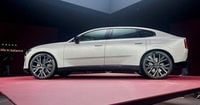On Tuesday, April 29, 2025, Volvo Cars announced a significant cost-cutting initiative of 18 billion Swedish krona ($1.87 billion) amid troubling financial results for the first quarter of the year. The automaker, owned by China's Geely Holding, revealed that its operating profit plummeted by 60% to 1.9 billion krona, a stark decline from 4.7 billion krona in the same period last year. This decline reflects a narrowing margin on earnings before interest and taxes (EBIT) from 5% to 2.3% over the year, coupled with a drop in revenue from 93.9 billion krona to 82.9 billion krona.
CEO Håkan Samuelsson, who recently returned to the helm after the departure of former CEO Jim Rowan, cited several contributing factors to these disappointing results. "There is a rather heavy headwind on the market," he explained in an interview with CNBC's "Europe Early Edition." Samuelsson pointed to a decline in wholesales as part of a planned inventory reduction, adverse currency effects, and broader turbulence within the automotive industry as key elements affecting performance.
In light of these challenges, Volvo has decided to withdraw its financial guidance for both 2025 and 2026. Samuelsson noted, "There is a volume drop, and on top of that also price competition, new players in the electric segment, especially, but also influencing the prices generally. And on top of that you have the turbulence now with additional tariffs, so all of that makes it very difficult to predict the future." This uncertainty has led to a sharp decline in the company's stock, with shares dropping as much as 10% on Tuesday before settling at an 8.1% loss by the afternoon.
As part of the "cost and cash action plan," Volvo Cars will implement cuts in investments and announce layoffs across its global operations. While the company did not specify the scale of the job reductions, it indicated that white-collar jobs would be among those affected as it seeks to streamline its organization. Samuelsson emphasized the need for efficiency, stating, "We need to be more efficient in our white-collar areas, need to slim down the organization. (We need to) work smarter, and that of course will lead to a reduction of personnel."
Volvo's restructuring efforts will also include a focus on its U.S. operations, which have been significantly impacted by recent trade tariffs. U.S. President Donald Trump imposed a 25% tariff on imported vehicles earlier this month, and further tariffs on auto parts such as engines and transmissions are set to take effect no later than May 3, 2025. Samuelsson remarked, "We see long-term, we need, of course, to come back to some kind of trade deal with the U.S. Otherwise, this is of course going to be very difficult for the business in the U.S."
To mitigate the impact of these tariffs, Volvo plans to enhance its manufacturing capabilities in the U.S. by utilizing its Charleston, South Carolina factory more effectively. Samuelsson mentioned, "We are looking into utilizing our Charleston factory better. So, we need another car into that factory and that has to be a best-seller for the U.S. market. It's something that we otherwise need to import and pay tariffs for. So, that's really the countermeasures we are taking."
As part of its long-term strategy, Volvo aims to have electrified vehicles—defined as any car with a charging cord—account for 90% to 100% of its global sales volume by 2030. The company reported that its sales share of electrified cars reached 43% in the first quarter of this year, indicating a strong push towards electric mobility despite current market challenges.
Samuelsson is optimistic about the future, expressing hope that a trade deal can be reached between the U.S. and Europe that would alleviate some of the tariff pressures. He stated, "I'm a bit optimistic that there will probably be a deal so we can start up trade between U.S. and Europe." In the meantime, the company remains committed to its electrification strategy, recognizing the global shift towards electric vehicles outside of the U.S.
As Volvo Cars navigates these turbulent waters, the focus will be on leveraging synergies with its parent company Geely, which is expected to provide at least 3 billion crowns of support as part of the cost-cutting measures. "It would be a waste not to be utilizing these synergies that are really unique for our company," Samuelsson remarked, highlighting the potential for shared resources and supplier networks to bolster the company's financial health.
In summary, Volvo Cars faces a challenging landscape as it implements sweeping changes to its operations in response to declining profits and increasing tariff pressures. With a strategic focus on electrification and local manufacturing, the company aims to adapt to the evolving automotive market while safeguarding its future in a highly competitive industry.




